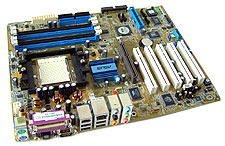 Unreal Tournament
2003 Unreal Tournament
2003 |
Source:
Epic |
|
Unreal
Tournament 2003 is the sequel to 1999's multiple 'Game of the Year' award
winner. It uses the very latest Unreal Engine technology - where graphics, sound
and game play are taken beyond the bleeding edge. Unreal Tournament 2003 employs
the use of Vertex as well as Pixel Shaders and it's recommended that you use a
DirectX 8 videocard to get the most out of the game.
In UT2003 we find that both motherboards perform about
the same, which shouldn't be too much of a surprise by now. Overclocking boosts
the overall frame rates by a small margin.
Athlon64 socket 939 = Damn
fast!
I know of many users who were not happy with AMD's two
pronged approach with the Athlon64 and Athlon64 FX CPU. Knowing that Socket 939
would eventually unite the two lines, many simply decided to waited it out until
there was a more stable platform to upgrade to... and upgrade from in the
future. Now that the Socket 939 Athlon64 processor is upon us, I think it's safe
to expect more manufacturers start pushing out their AMD motherboards.
 Since AMD has moved the
memory controller straight into the CPU die itself, it should
be pretty obvious that Athlon64 processors are damn fast, no matter what chipset
the motherboard is paired with. The Asus A8V motherboard we've tested in this
review uses VIA's K8T800 Pro/VT8237 combination, and true to form, the board was
pretty potent in the benchmarks!
Since AMD has moved the
memory controller straight into the CPU die itself, it should
be pretty obvious that Athlon64 processors are damn fast, no matter what chipset
the motherboard is paired with. The Asus A8V motherboard we've tested in this
review uses VIA's K8T800 Pro/VT8237 combination, and true to form, the board was
pretty potent in the benchmarks!
In terms of features the Asus A8V supports 7.1 audio,
IEEE 1394, Gigabit LAN, Serial ATA RAID, up to 4GB of unbuffered dual channel
DDR RAM, and a few other things. Despite all the integrated peripherals, Asus is
still able to include five PCI 32bit PCI slots for your upgrading needs.
As the benchmarks have indicated, stock performance of
the Asus A8V was great, it's easily one of the fastest motherboards we've ever
tested in the PCStats labs, and it also maintains a very slight edge on the
nVidia nForce3 Ultra solution. With respect to overclocking, the A8V is
moderately capable, but nothing special. The multiplier control was limited to a
maximum FSB of 220 MHz, and VIA's on-again-off-again AGP/PCI lock didn't help
the matter either. What really drives home the Asus A8V, and the reason why this
board has walked away with PCstats Editors Choice Award, is its retail price of
$195 CDN ($143 US). As a flagship
motherboard the the Asus A8V is priced very aggressively, and if you are
lucky enough to be buying a Socket 939 Athlon64 in the near future, make sure
you check out the Asus A8V!

